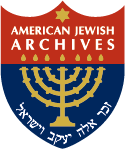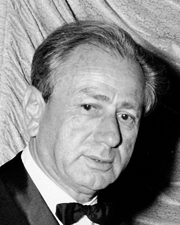TABLE OF CONTENTS

Finding Aid to the Joachim Prinz Papers. 1935-1980 (bulk 1965-1977)
Manuscript Collection No. 673
Introduction |
|
| Repository: | The Jacob Rader Marcus Center of the American Jewish Archives |
| Creator: | Prinz, Joachim, 1902-1988 |
| Title: | Joachim Prinz Papers |
| Dates: | 1935-1980 |
| Bulk Dates: | 1965-1977 |
| Quantity: | 3.6 linear feet (9 Hollinger boxes) |
| Abstract: | Rabbi Joachim Prinz (1902-1988) was a congregational rabbi, scholar, and activist in Jewish communal affairs. This collection contains correspondence and manuscripts relating to his professional career as a pulpit rabbi and his involvement in organizations such as the American Jewish Congress, World Jewish Congress, and Conference of Presidents of Major American Jewish Organizations. The span dates for the collection are 1935-1980, with the bulk of the material spanning the years 1965-1977. |
| Collection Number: | MS-673 |
| Language: | Collection material in English. |
Biographical Sketch

Joachim Prinz was born in Burckhardtsdorf in Upper Silesia on May 10, 1902, one of four children of Joseph Prinz, a department store owner, and Nani (Berg) Prinz. After learning English as a child, the teenage Prinz became a follower of the Zionist leader Theodor Herzl. Following graduation from secondary school in Oppeln, Upper Silesia in 1921, Prinz studied philosophy and art history at the Universities of Breslau and Berlin, and received a doctor of philosophy degree at the University of Giessen in 1924. The following year he was ordained a rabbi by the Jewish theological seminary of Berlin.
Invited to Berlin in January 1926, Prinz became the youngest ordained rabbi to serve the Jewish community of that city. During Hitler's rise to power in the 1920s and until his departure from Germany in 1937, Prinz was a vocal and public critic of Nazism. Through his writings and speeches Prinz made numerous attacks on the Nazis, resulting in his being repeatedly arrested by the Gestapo.
In 1937 Prinz came to the United States at the invitation of Rabbi Stephen S. Wise and, once there, decided to immigrate to America with his family. After returning to Germany to gather his family and his belongings, a farewell meeting was held in his honor in Berlin where he addressed 2,000 persons - one of whom was Adolf Eichmann, who was monitoring the meeting in his role as a Gestapo official. Though having decided to emigrate, Prinz was formally ordered to leave Germany in 1937, a directive which came from the government in the form of a signed expulsion order.
For the next two years Prinz toured the U.S. raising funds for the United Palestine Appeal while lecturing on European affairs. On September 9, 1939 Prinz was installed as rabbi of Temple B'nai Abraham in Newark (and later, Livingston), New Jersey upon the recommendation of Rabbi Wise, who called Prinz "one of the most gifted and brilliant young men...in the rabbinate."
In addition to his congregational work, Prinz became active in national and world affairs. In 1946 he became a member of the executive board of the World Jewish Congress (WJC). He also served as vice-president and chairman of the governing board of the WJC, as well as being president of the American Jewish Congress from 1958-1966. From 1965 to 1967 Prinz was chairman of the Conference of Presidents of Major American Jewish Organizations. He served as director of the Conference on Jewish Material Claims Against Germany as well as chairman of the World Conference of Jewish Organizations and the Commission on International Affairs of the American Jewish Congress.
Prinz was active in social issues, including the civil rights movement throughout the 1960s, being one of ten founding chairman of the 1963 march on Washington for civil rights. Prinz spoke at the August rally, appearing on the podium just moments before the Reverend Dr. Martin Luther King delivered his famous "I have a dream" speech. Earlier, in April 1960 , Prinz led a picket line in front of a Woolworth store in New York City, protesting discrimination against African Americans at lunch counters in Southern states.
Prinz also led many battles against anti-Semitism, both in his native Germany and in the U.S. In 1954 Prinz challenged a libelous attack made upon him by an anti-Semitic publication, Common Sense, and won a landmark court victory - one that indicated racial and religious libels could effectively be challenged in the courts. In 1964 he led a group of American Jewish Congress leaders who were arrested, then later acquitted, for protesting an anti-Israel mural in the Jordanian pavilion at the World's Fair.
Prinz authored several works in German and English. His major writings in German were: Das Leben Im Ghetto (Life in the Ghetto) and Wir Juden (We Jews), which was considered perhaps his most important work of that period. Some of his major writings in English were: The Dilemma of the Modern Jew; Popes from the Ghetto; and The Secret Jews . He served on the editorial boards for Judaism and the Reconstructionist and was a contributor to other volumes. He received honorary degrees from Hebrew Union College-Jewish Institute of Religion, Hofstra University, and Upsala College.
On December 25, 1925 Prinz married Lucie Horowitz, who died on January 14, 1931. He had one daughter (Lucie) from this marriage. On May 24, 1932 he married Hilde Goldschmidt, with whom he had three children: Michael, Jonathan, and Deborah. The Prinzes also adopted another daughter, Jo, who lost her family at Auschwitz.
Joachim Prinz died on September 30, 1988 at the age of 86.
(Note: Portions of this biographical sketch relied heavily upon and others were taken verbatim from material in the Joachim Prinz nearprint biography file located at the American Jewish Archives.)
Scope and Content Note
Rabbi Joachim Prinz (1902-1988) was a congregational rabbi, scholar, and activist in Jewish communal affairs. This collection contains correspondence and manuscripts relating to his professional career as a pulpit rabbi and his involvement in Jewish communal and organizational life. The span dates for the collection are 1935-1980, with the bulk of the material covering the years 1965-1977.
The Joachim Prinz papers reflect most heavily Prinz's activities in three organizations: the American Jewish Congress, the World Jewish Congress, and the Conference of Presidents of Major American Jewish Organizations. Documented in these files are events and causes that reverberated throughout American – and international – society during this time: Zionism, the Arab-Israeli conflict, civil rights, capital punishment, poverty, anti-Semitism, etc.
Prinz's role and activities as a key figure in many American Jewish organizations brought him into contact with prominent political and lay leaders. As a result, this collection is rich with letters that carry the voices of a wide array of individuals, both powerful and common, that reflect a diverse spectrum of thought and opinion on the persons and events of that era. The collection contains correspondence with presidents (Lyndon B. Johnson, Richard M. Nixon), senators, congressmen, rabbis, Christian leaders, and others. The general files contain mostly correspondence with individuals, while organizational files reflect Prinz's official involvement in specific causes and organizations.
Two files, one for Rabbi Barry Friedman and the other for Temple B'nai Abraham (which contains mostly correspondence with Bernard Feinberg, executive director of the temple), reveal much of Rabbi Prinz's duties and involvements as a congregational rabbi from the late 1960s to his retirement in 1977. One folder of material pertaining to Temple B'nai Abraham is restricted until the year 2026 and is located in the Rare Documents file.
The manuscripts and writings series contains -- often with marginalia and other handwritten corrections and notations -- sermons and essays written by Prinz, together with his research notes on various topics, authors, and persons (i.e., The Diary of Anne Frank, Moses Mendelssohn, Walter Rathenau). The series also contains Prinz's correspondence with various publishers concerning the publication of his manuscripts and books. This series concludes with two files of writings by others which Prinz collected, used as reference material and, occasionally, commented upon.
Some of the non-textual materials donated with the collection have been removed and cataloged separately. These include audio recordings of sermons and addresses given by Prinz that have been cataloged and placed into the sound recordings collection of the American Jewish Archives. Thirty-five audio cassettes have been cataloged as AJA cassette numbers C-4135 to C-4168 and C-4175. Nineteen audio reels have been cataloged as AJA reel numbers TR-3588 to TR-3606. One box of audio discs is included in box 9 within Series B.
One packet of photographs has been placed into the Joachim Prinz photograph file. One compact disc containing photographs of Prinz has been cataloged as CD-20.
Conditions of Access and Use
Terms of Access
With regard to the autobiography of Dr. Joachim Prinz and his collected sermons and speeches, the AJA shall refer all requests to use portions of such selected works to donors for donors' approval.
Box 4, Folder 3, pertaining to Temple B'nai Abraham is restricted until the year 2026.
Terms of Reproduction and Use
Copyright restrictions may apply. Authorization to publish, quote, or reproduce, with exceptions for fair use, may be obtained through the American Jewish Archives, Cincinnati, Ohio. Please address queries to the Executive Director of the American Jewish Archives. For more information, see the American Jewish Archives copyright information webpage.
Related Material
Related Collections
Prinz, Joachim. Nearprint file.
Prinz, Joachim. Picture file.
Prinz, Joachim. Correspondence with and concerning Senator Barry Goldwater and his 1964 candidacy for president. Small Collections file.
Prinz, Joachim. English translation by Louise Waterman Wise of Rabbi Prinz's book,We Jews . Small Collections file.
Separated Material
Prinz, Joachim. C-4135 to C-4168 and C-4175. Cassette recordings of Joachim Prinz.
Prinz, Joachim. TR-3588 to TR-3606. Reel-to-reel recordings of Joachim and Jonathan Prinz.
Prinz, Joachim. CD-20. Photographs.
Prinz, Joachim. Correspondence pertaining to Temple B'nai Abraham of Essex County (Livingston, N.J.). Restricted until 2026. Rare Documents file.
Administrative Information
Preferred Citation
Footnotes and bibliographic references should refer to the Joachim Prinz Papers and the American Jewish Archives. A suggestion for at least the first citation is as follows:
[Description], [Date], Box #, Folder #. MS-673. Joachim Prinz Papers. American Jewish Archives, Cincinnati, Ohio.
Provenance
The Joachim Prinz papers were received from Rabbi Jonathan Prinz and the Prinz family, New York, N.Y.; Rabbi Clifford Kulwin, Livingston, N.J.; and Temple B'nai Abraham of Essex County, Livingston, N.J., in 2001.
Processing Information
Processed by Kevin Proffitt, January 2002.
Box and Folder Listing
Search Terms
The following terms have been used to index the description of this collection in the AJA's online catalog.